Understanding Hypoallergenic Laundry Soap: A Guide
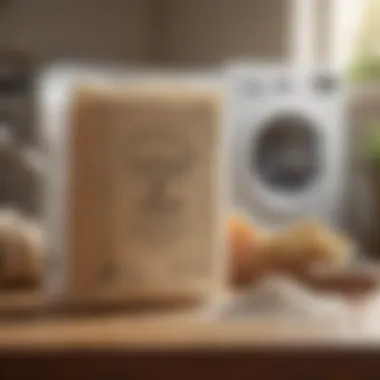

Intro
Understanding hypoallergenic laundry soap involves dissecting intricate layers of formulation, effectiveness, and individual response. For many, the term "hypoallergenic" has become synonymous with safety regarding skin sensitivities. This article unpacks the essence of hypoallergenic products, focusing on their importance for people afflicted by allergies or delicate skin. By delving into brand comparisons, practical guidance on product selection, and debunking myths, readers can cultivate informed choices that favor well-being. Furthermore, environmental implications and recommendations for improving laundry routines primes consumers for a comprehensive experience with hypoallergenic soap.
Current Trends
As consumer awareness of skin sensitivities rises, hypoallergenic laundry soap is increasingly in demand. Many brands have adapted their offerings to meet the needs of a discerning public.
Formulation Details
Hypoallergenic products generally omit common irritants found in traditional soaps. These can include:
- Fragrances
- Dyes
- Harsh chemicals
Opting for natural ingredients is also a growing trend. Many users look for plant-based formulations that are as effective as they are gentle. Consumers now often check labels, seeking certifications that indicate a product is truly hypoallergenic.
Eco-Friendly Considerations
As demand for hypoallergenic options grows, there is another trend surfacing: environmental consciousness. Many brands are adopting eco-friendly practices, such as recyclable packaging and sustainably sourced ingredients. This shift responds to a larger market trend towards products that are beneficial for both personal health and the planet.
Visual Ideas
While this section may not align directly with hypoallergenic soap, creating visual connections for consumers can enhance understanding.
Styled Laundry Spaces
Sharing images of styled laundry spaces can provide inspiration on incorporating hypoallergenic products into daily routines. A clean, organized environment often aids in stress reduction, which is particularly valuable for individuals managing allergies or sensitivities.
Before-and-After Comparisons
Visual transformations of laundry routines could highlight the effectiveness of switching to hypoallergenic products. Images showing improvements in fabric quality and overall wash appeal may influence consumer decisions toward adopting these products.
"Choosing the right hypoallergenic laundry soap can significantly improve the quality of life for sensitive individuals."
The End
Understanding hypoallergenic laundry soap requires navigating current trends, product specifics, and personal needs. Awareness of formulation details and their broader implications encourages wise choices that benefit both the consumer and the environment. The pursuit of knowledge in this area not only enhances individual laundry routines but also aids in cultivating healthier living environments.
Prolusion to Hypoallergenic Laundry Soap
Hypoallergenic laundry soap has gained increasing importance in household cleaning, particularly for individuals with sensitive skin or allergies. Traditional laundry detergents often contain irritants like dyes, fragrances, and harsh chemicals. For many, these ingredients can trigger allergic reactions or skin irritations. Thus, understanding hypoallergenic options becomes essential for ensuring a safe washing experience.
The term "hypoallergenic" refers to a product formulated to minimize the risk of triggering allergies. It typically means fewer allergens and irritants. However, not all hypoallergenic soaps are created equal. Some individuals may still experience sensitivities, as reactions can be influenced by various factors.
Definition and Key Features
Hypoallergenic laundry soap is characterized by its reduced levels of allergens and irritants. These soaps often exclude common components like synthetic fragrances and dyes. Instead, they opt for simpler, more gentle formulas. While packaging may vary, users will often find descriptions such as "free from irritants" or "gentle on skin" prominently displayed.
Key features include:
- Limited Ingredients: A typical hypoallergenic soap avoids common irritants that can provoke reactions.
- Simple Formulations: These products usually contain fewer ingredients, focusing on cleaning efficacy without aggressive additives.
- Clinical Testing: Some brands conduct dermatological tests to ensure their product's safety for sensitive skin.
Importance in Household Cleaning
Having a hypoallergenic laundry soap is vital for households that include individuals with sensitivities. For children, elderly family members, or anyone with eczema or respiratory concerns, using a mild soap can significantly enhance their comfort and well-being. Moreover, the importance extends beyond just personal health. It also encompasses the broader household environment.
Using hypoallergenic products contributes to maintaining cleaner air quality, as fewer volatile organic compounds (VOCs) are released during the washing process. In addition to environmental benefits, the reduction of irritants generally results in fewer health issues tied to allergens.
"Opting for hypoallergenic laundry soap is a step towards a healthier home environment, especially when sensitive skin is a concern."
The Science Behind Hypoallergenic Formulations
Hypoallergenic laundry soap is designed with a primary goal: reducing the likelihood of allergic reactions and skin irritations. This section examines the scientific principles that underlie hypoallergenic formulations. Understanding these principles serves to emphasize not just the product's effectiveness but also its suitability for diverse skin types, making it a pivotal topic in our discussion.
Understanding Allergens and Irritants
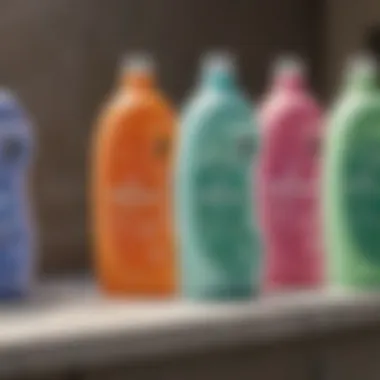
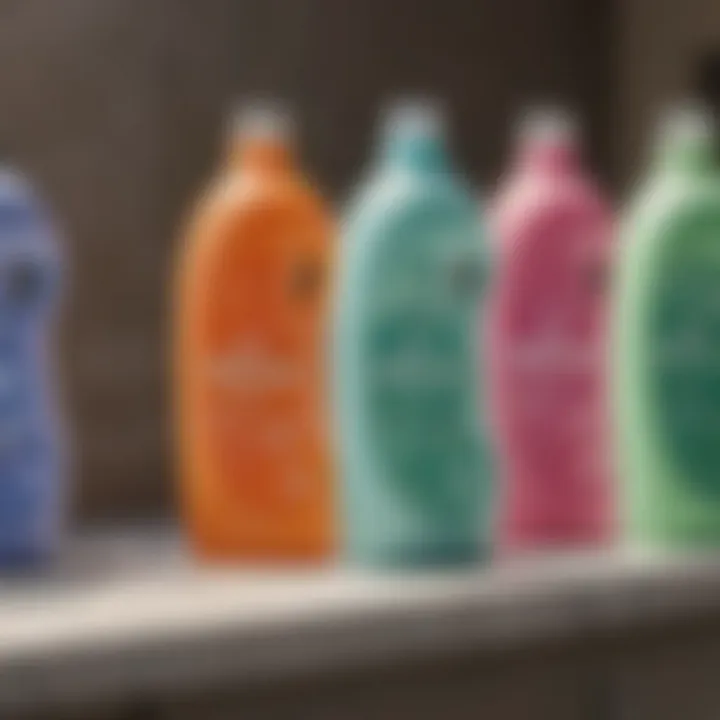
Allergens are substances that trigger allergic reactions. In the context of laundry products, common allergens can include fragrances, dyes, and certain preservatives. People with sensitive skin often react adversely to these components, leading to conditions such as eczema or dermatitis.
Irritants, on the other hand, can provoke discomfort or inflammation, even in individuals without allergies. Chemicals found in regular laundry soaps, such as heavy detergents or chlorine bleach, are frequent culprits. For those with sensitive skin, the challenge lies in navigating products laden with these triggering agents. Consequently, understanding allergens and irritants is crucial for selecting the appropriate hypoallergenic laundry soap.
Chemical Composition of Soap
The chemical makeup of hypoallergenic soap differentiates it significantly from standard alternatives. Typically, hypoallergenic formulations use milder cleaning agents and avoid harsh chemicals. They often rely on surfactants derived from natural sources. For example, coco-glucoside and sodium lauryl sulfate are milder options compared to traditional sulfates.
Additionally, the absence of synthetic fragrances and dyes considerably reduces the risk of allergic reactions. Allergenic ingredients are substituted with more benign options that still provide effective cleaning power. The overall composition aims to maintain cleanliness without provoking any adverse skin responses.
How Formulations Minimize Reactions
Hypoallergenic laundry soap formulations are crafted to minimize allergic reactions and irritations through careful selection of ingredients.
- Mild Surfactants: These help break down stains while being gentle on the skin.
- No Added Fragrance: Without artificial scents, the likelihood of reactions decreases.
- Fewer Preservatives: Many hypoallergenic soaps limit the use of preservatives, which can be irritants in some cases.
- pH Balanced: Maintaining a neutral pH helps prevent skin irritation.
"Choosing hypoallergenic soap is not just about avoiding allergies; it's about enhancing overall skin health."
Hypoallergenic vs. Regular Laundry Soap
Hypoallergenic laundry soaps have gained significant attention as alternatives to regular laundry detergents. Understanding the differences between these two categories is crucial for consumers, especially those managing sensitive skin, allergies, or other skin conditions. This section will provide a detailed analysis of the ingredients, efficacy in removing stains, and real user experiences with both types of soaps.
Comparison of Ingredients
The main distinction in the ingredient lists of hypoallergenic and regular laundry soaps lies in the presence of potential irritants. Hypoallergenic soaps usually contain fewer synthetic additives, dyes, and fragrances. Many people with allergies or sensitive skin find that their reactions stem from these added components. Conversely, regular laundry soaps may include these extras to enhance fragrance or color, making them appealing for general use but potentially problematic for sensitive individuals.
- Hypoallergenic Laundry Soap:
- Regular Laundry Soap:
- Contains fewer chemicals.
- Typically free from artificial fragrances.
- Utilizes milder surfactants and enzymes.
- May still contain natural ingredients which will be less irritating.
- Often has brighteners and other additives to improve cleaning.
- Fragrance options can be strong and varied.
- May include phosphates that enhance performance but could irritate sensitive skin.
"Choosing a laundry soap aligned with your skin's needs can significantly impact daily comfort and health."
Efficacy in Stain Removal
The effectiveness of a laundry soap involves its ability to remove stains and odors. Hypoallergenic soaps are typically formulated with less aggressive ingredients, which might raise concerns about their cleaning power. Nonetheless, many of these products are surprisingly effective in stain removal, especially for light to moderate stains. The efficacy often relies on the formulation, where mild ingredients work in synergy to dislodge dirt without causing skin irritation.
Regular laundry soaps, although efficient in stain removal, may accomplish this with harsher chemicals that can pose risks to sensitive skin. It is essential to note that the strength of a stain often dictates the choice of soap. For example:
- Light Stains: Hypoallergenic methods may suffice.
- Heavy Stains: Regular detergents might work better but could cause skin reactions.
User Experiences and Testimonials
Consumer feedback provides valuable insights regarding hypoallergenic and regular laundry soaps. Many users report that switching to hypoallergenic options leads to noticeable improvements in skin comfort. Individuals previously irritated by traditional detergents often find relief after switching. On many platforms such as Reddit, users share similar stories, emphasizing the importance of considering skin types and allergy history.
In contrast, some users of regular soaps appreciate the strong scents and vibrant cleaning results, highlighting the balance needed between personal preference and skin health.
- Positive experiences with hypoallergenic soaps often include:
- Regular soap user testimonials may mention:
- Reduced itching and rashes.
- Safer for use on baby clothes.
- Versatile for various fabrics without adverse reactions.
- Effective in removing tough stains.
- Pleasing scents that last.
- Satisfactory results across different washing machines and cycles.
Ultimately, selecting between hypoallergenic and regular laundry soaps will depend on evaluating one’s personal needs, available ingredient knowledge, and specific laundry challenges. Regular laundry detergents may provide powerful cleaning, but for sensitive skin, hypoallergenic options often present a safer and gentler solution.
Top Brands of Hypoallergenic Laundry Soap
When considering hypoallergenic laundry soap, it is essential to be informed about the brands that excel in formulating products catering to those with skin sensitivities and allergies. The effectiveness of hypoallergenic products greatly varies across different manufacturers, making it crucial to understand their offerings. Each brand has distinct features, benefits, and consumer feedback that can influence your choice. This section will delve into specific brands, highlighting the unique qualities and experiences associated with them.
Brand A: Features and Benefits
Brand A, known for its commitment to hypoallergenic solutions, formulates laundry soap specifically designed with sensitive skin in mind. The primary features include:
- Free from harsh chemicals: The soap avoids certain chemicals common in traditional detergents, which helps to reduce risks of irritation.
- Natural ingredients: Ingredients are sourced from nature, enhancing safety for users.
- Dermatologist tested: Many users recommend this brand due to past clinical trials that underscored its gentle nature.
Benefits users have reported include improved skin comfort, particularly for those who were previously suffering from conditions such as eczema or dermatitis. This soap retains effectiveness in removing common stains while being mindful of delicate skin.


Brand B: Customer Reviews
Customer feedback on Brand B emphasizes its reliability and effectiveness. Many reviews from users state positive experiences regarding its stain-removal capabilities and skin safety. Key themes identified in reviews include:
- Satisfaction with performance: Users appreciate that the soap meets their cleaning needs while not aggravating sensitive skin.
- Pleasant fragrance: Unlike some hypoallergenic products, Brand B offers a subtle fragrance that many find appealing without overwhelming.
- Affordability: A common sentiment among users is the excellent balance between price and quality, making it a viable option for families.
Reviewers frequently note that they would recommend this product to others seeking hypoallergenic options. Therefore, positive customer testimonials contribute to Brand B’s reputation and reliability.
Brand C: Unique Selling Points
Brand C differentiates itself through unique features and marketing strategies that appeal to conscientious consumers. Highlights of this brand include:
- Eco-friendly initiatives: They prioritize sustainability through biodegradable packaging and eco-conscious sourcing of ingredients.
- Allergen-free certification: Brand C often boasts certifications that reinforce its commitment to being free from major allergens, which can reassure users.
- Focused product line: With a concentrated lineup of products, Brand C specializes in tailoring its offerings to specific needs of consumers, making it a go-to choice for those looking for targeted solutions.
Overall, the unique selling points of Brand C attract environmentally aware consumers and those with strict dietary requirements regarding their laundry products.
In summary, the landscape of hypoallergenic laundry soap is rich with options, and understanding the various brands allows consumers to make informed decisions that cater to their personal preferences and needs.
Choosing the Right Hypoallergenic Laundry Soap
Choosing the correct hypoallergenic laundry soap is central to achieving a cleaning solution that caters to sensitive skin. Many individuals and families with allergies or skin sensitivities face challenges when selecting a suitable product. It is crucial to understand that not all hypoallergenic soaps are equal. Therefore, one must take several factors into account when making a choice. This section highlights the importance of understanding personal needs, effectively reading labels, and considering price versus quality when selecting the right product.
Evaluating Personal Needs
The first step in choosing the appropriate hypoallergenic laundry soap is evaluating personal needs. Each individual may have a differnt reaction to various ingredients. For example, a person with eczema may require a soap that is completely void of fragrances, while another might tolerate certain natural scents. Documenting what has worked or not worked in the past can be beneficial.
Additionally, consider any specific requirements like baby clothes, which might necessitate a gentler formula. Prior knowledge of skin sensitivities should shape the selection process. Options like Tide Free & Gentle or Seventh Generation Free & Clear are among commonly recommended products for sensitive skin.
Reading Labels Effectively
Effective reading of product labels is essential. Hypoallergenic does not guarantee that a product is free from allergens or irritants, so it is wise to investigate further. Ingredients should be assessed carefully. Look for listings that contain terms like "dye-free" or "fragrance-free," as these are often indicators of a gentler formulation.
It's also important to recognize the difference between natural and synthetic ingredients. Sometimes, natural substances can trigger allergies, whereas certain synthetics may be non-irritating. Understanding chemical names can help consumers avoid potentially harmful components. The Environmental Working Group provides tools and resources to help decode product labels.
Price vs. Quality Considerations
The relationship between price and quality in hypoallergenic laundry soap can sometimes be misleading. While higher-priced products often boast superior formulations, they do not always guarantee better results. It is possible to find reliable, effective, and affordable options.
In some cases, generic brands may offer similar formulations to name brands at a lower cost. Conducting a little research on reviews and comparisons can aid in identifying worth while products that fit a budget. It is advisable to balance cost considerations with the health and safety of those using the products.
Price should never come at the cost of effectiveness, especially when dealing with skin sensitivities.
Impact on Sensitive Skin
Hypoallergenic laundry soap plays a crucial role for individuals with sensitive skin. Many people experience discomfort due to certain detergents. Chemicals in regular laundry soaps can cause irritation, rashes, and allergic reactions. Choosing hypoallergenic products minimizes these risks. These soaps are formulated to be gentle. They avoid harsh chemicals and fragrances, focusing instead on safer alternatives that clean effectively without harming delicate skin.
Identifying Skin Sensitivities
To understand the impact of hypoallergenic soap, we first need to identify what triggers skin sensitivities. Common symptoms include:
- Itching
- Redness
- Dryness
- Rashes
- Allergic reactions
If you experience these symptoms after using a particular detergent, it is wise to seek a hypoallergenic option. Humidity, temperature changes, and exposure to different environments also influence skin sensitivity. Keeping a diary of your skin’s reaction to various products can help pinpoint specific irritants. For those with conditions like eczema or psoriasis, hypoallergenic soaps can provide much-needed relief.
Long-term Benefits of Use
Using hypoallergenic laundry soap offers multiple long-term benefits. First, it helps maintain skin health by reducing exposure to irritants. This is especially vital for children and individuals with existing skin conditions. Second, hypoallergenic options often result in overall skin improvement.
Additionally, these products are designed to remove allergens from clothing and linens. Regular use can lead to fewer flare-ups and a more comfortable daily experience. One study indicated that consistent use of gentle detergents can lead to sustained health of the skin. Not having to deal with constant irritation can significantly enhance the quality of life.
Environmental Considerations
The impact of laundry soap on the environment is increasingly coming into focus. For consumers, especially those who care about sustainable living, understanding the environmental considerations surrounding hypoallergenic laundry soap is crucial. As more people choose products that align with ecological values, the demand for eco-friendly options rises. This section will explore vital aspects of hypoallergenic laundry soap that make it an environmentally responsible choice.
Eco-Friendly Packaging
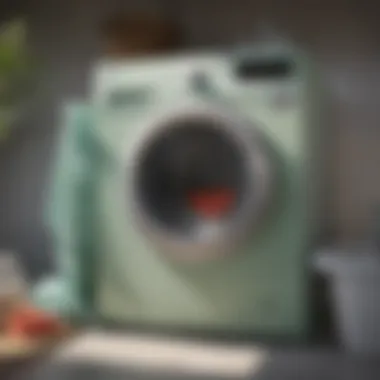
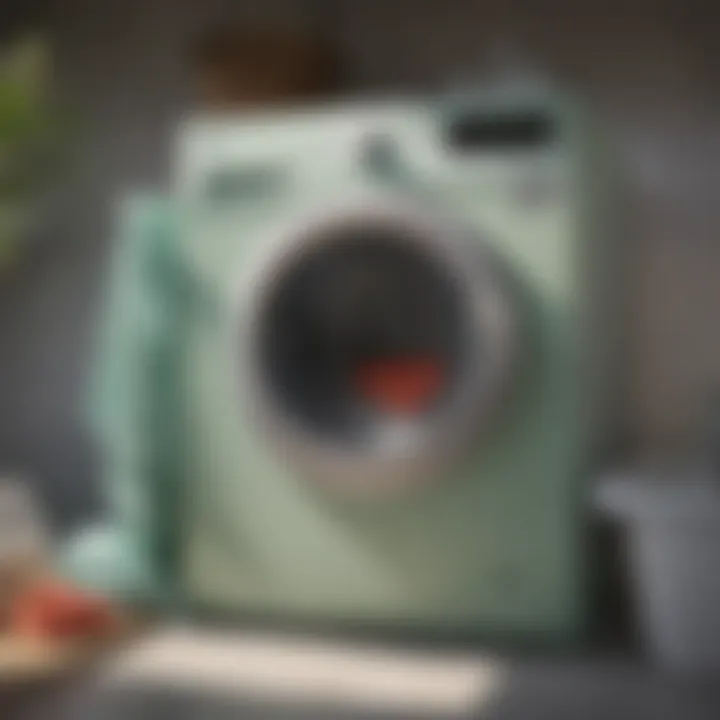
Packaging is often overlooked but plays a large role in the environmental footprint of laundry products. Many hypoallergenic laundry soap brands are adopting eco-friendly packaging solutions. This includes using recyclable materials and minimizing plastic use. By opting for packaging that is biodegradable or made from recycled content, companies demonstrate a commitment to sustainability.
Additionally, concentrated formulas are gaining popularity. These require less packaging, as a smaller container can hold a higher dosage. This approach not only reduces waste but also cuts down on transportation emissions, as more product can be shipped with less material. Buying concentrated options can thus have an indirect positive impact on the environment.
Biodegradable Ingredients
The formulation of hypoallergenic laundry soap often prioritizes biodegradable ingredients. Conventional soaps might contain chemicals that do not break down easily in the environment, contributing to pollution in waterways. Conversely, many hypoallergenic options use plant-derived ingredients that are designed to decompose effectively.
Using biodegradable ingredients helps reduce the ecological impact of laundry routines. When these substances enter wastewater systems, they are less likely to harm aquatic ecosystems. It is essential to verify that the product claims biodegradability and ensure compliance with industry standards. Some common biodegradable components in hypoallergenic soaps include coconut-based surfactants and enzymes from natural sources.
"Choosing laundry soaps with biodegradable ingredients is not just better for sensitive skin, but also aligns with a cleaner, greener planet."
In summary, when selecting hypoallergenic laundry soap, understanding the environmental benefits can inform more responsible consumer choices. By supporting products with eco-friendly packaging and biodegradable ingredients, consumers contribute to a more sustainable future.
Common Misconceptions about Hypoallergenic Products
In the world of cleaning products, misconceptions can create confusion, especially regarding hypoallergenic laundry soaps. Understanding what is true and what is just marketing hype is crucial for consumers, particularly those with sensitive skin or allergies. By addressing these misconceptions, this section aims to provide clarity and empower readers to make informed choices.
Hypoallergenic Does Not Mean Allergy-Free
A significant misconception that surrounds hypoallergenic products is the belief that they are completely allergy-free. The term "hypoallergenic" suggests that a product is less likely to cause allergic reactions when compared to traditional products. However, this does not guarantee that there will be no reaction at all. Individual sensitivities vary greatly, and what may be safe for one person could trigger a reaction in another.
When selecting laundry soap, it is important for consumers to recognize that hypoallergenic simply indicates a reduced risk for irritation. This means that while many hypoallergenic soaps are formulated to exclude common allergens—such as dyes and fragrances—they may still contain components that could provoke an allergic response. Therefore, reading the label and understanding potential allergens in the product is essential.
Key Point: Hypoallergenic products are formulated to minimize allergens, but they do not ensure an allergy-free experience.
Natural Ingredients vs. Synthetic Ingredients
Another common misconception lies in the debate between natural and synthetic ingredients. Many consumers assume that natural ingredients are automatically better and safer for sensitive skin. However, this is not always the case. Natural substances can also cause allergic reactions, just like synthetic chemicals. For instance, essential oils, often seen as gentle and natural alternatives, can be potent allergens for some individuals.
Conversely, synthetic ingredients are meticulously tested for safety and efficacy. Many hypoallergenic soaps utilize synthetic ingredients that are designed to perform effectively while minimizing reactions. When evaluating options, it is crucial to consider the individual formulation rather than relying solely on the classification as natural or synthetic.
In summary, both natural and synthetic ingredients hold potential risks and benefits. The decision should be made based on a careful review of the ingredients used and how they work for one's personal needs, rather than healthy assumptions about their source or classification.
Practical Tips for Using Hypoallergenic Laundry Soap
Utilizing hypoallergenic laundry soap can significantly reduce skin irritations and allergies for individuals with sensitivities. However, to maximize benefits, it is crucial to employ effective washing techniques and proper storage methods. This section discusses practical tips that will enhance your laundry routine with hypoallergenic products, making the process more efficient while ensuring optimal results for sensitive skin.
Optimal Washing Techniques
When using hypoallergenic laundry soap, understanding the right washing techniques is essential. Start by measuring the recommended dosage as per the product’s label. Overdosing will not lead to cleaner clothes and may leave residue that can irritate the skin. Alternatively, underdosing may fail to remove stains or odors effectively.
Before washing, sort your laundry by color and fabric type. This can prevent color bleeding and damage to delicate fabrics. For optimal performance, use the right water temperature. Cold water is generally effective for most loads, especially if your water is pristine. It conserves energy and is gentler on fabrics.
Using the appropriate wash cycle also contributes to better outcomes. Delicate cycles are useful for sensitive items, while regular cycles suit heavier fabrics. Additionally, consider adding an extra rinse cycle to ensure all soap is washed out, reducing any potential residue on clothing.
"Hypoallergenic does not mean irritation-free; proper washing is needed to enhance skin safety."
Storage and Handling Recommendations
How you store and handle hypoallergenic laundry soap can impact its effectiveness. Always keep the soap in a cool, dry place, away from direct sunlight. Exposure to humidity or heat can alter its formulation.
Ensure the lid is tightly closed after each use to maintain its quality and prevent contamination. If the product comes in a liquid form, consider using a funnel when pouring it into measuring cups to avoid spills, which can lead to waste.
For families with children or pets, store the soap out of their reach to prevent accidental ingestion. Another consideration is to use a transparent container for powders, as this allows you to monitor the amount left and avoid running out unexpectedly. By managing storage effectively, you ensure your hypoallergenic laundry soap remains effective and safe for use.
Epilogue
The conclusion of this article serves as a vital component, summarizing the key insights and practical recommendation provided throughout the guide. It emphasizes the significance of choosing hypoallergenic laundry soap, especially for those who suffer from sensitive skin or allergies. This segment encapsulates the research and information gathered, allowing the reader to understand the complexities and benefits of hypoallergenic products.
By dissecting the various elements that contribute to the effectiveness of hypoallergenic laundry soap, the article aims to clarify misconceptions and encourage informed purchasing decisions. Understanding the role of ingredients, user experiences, and brand characteristics gives homeowners the knowledge they need to assess what best suits their needs.
Recap of Key Points
- Hypoallergenic laundry soap is formulated to reduce allergens and irritants.
- The science behind these products reveals a careful selection of ingredients meant to minimize skin reactions.
- Comparisons with regular laundry soap highlight differences in efficacy, particularly in stain removal and fragrance.
- Brand evaluations provide insights into user experiences, helping consumers make informed choices based on robust reviews.
- The advice on reading labels and assessing personal needs empowers users to make selections tailored to their unique situations.
Understanding these aspects allows homeowners to care for their laundry while prioritizing health.
Encouragement for Informed Decisions
As consumers navigate the many choices available in the market, it is crucial to approach decisions about laundry soap with a discerning mind. The insights provided in this guide are designed to empower individuals to evaluate products critically. By considering skin sensitivities, ingredient safety, and environmental impact, housewives and homeowners can choose hypoallergenic options that align with their needs and values.
Informed decisions not only benefit individuals with sensitivities, but they also contribute to broader health and environmental goals. By selecting products responsibly, consumers support the movement towards cleaner and safer household products. Therefore, as the laundry routine unfolds, the choice of hypoallergenic laundry soap should be one based on thoughtful consideration, rather than mere convenience.



